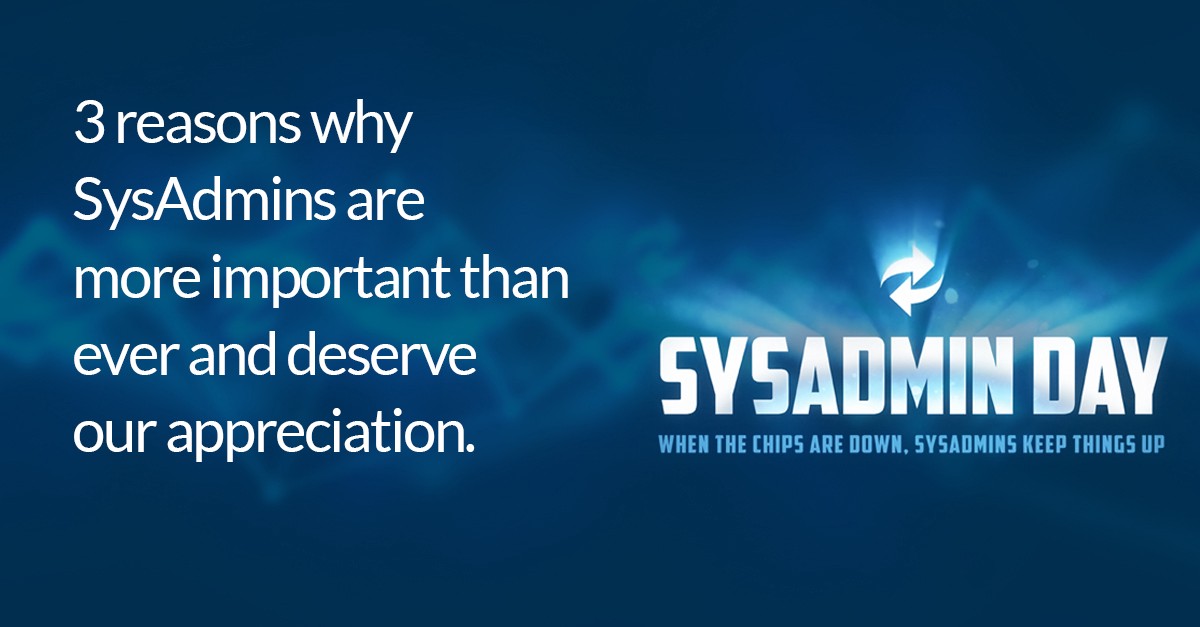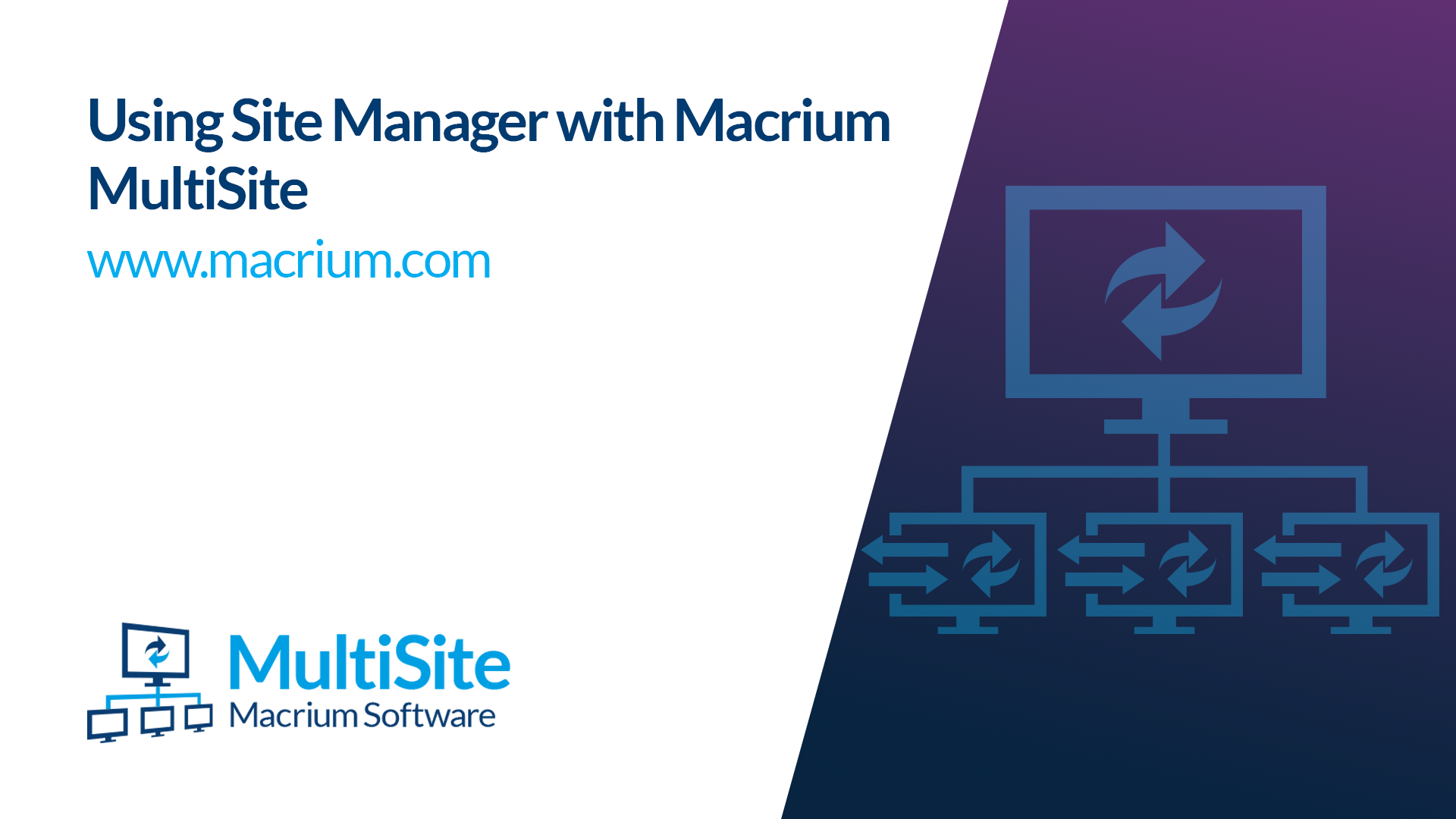3 reasons why SysAdmins are more important than ever and deserve our appreciation

If you check Reddit or Quora, you’d think that the SysAdmin role is one from an era that is quickly receding into memory. Claims and assertions that System Administration is a career in decline and warnings that those currently in the role need to rethink their future and their skills abound.
While there’s certainly some truth to the argument that system administration is changing thanks to trends like cloud and DevOps, the reality is that the sysadmin remains a critical role for every organization that depends on software — so, just about every single one on the planet today.
It’s for that reason the SysAdmin Appreciation Day is so important. At a time when fashion and interest appear to be transfixed by ostensibly ‘sexy’ job titles, such as SRE or Data Scientist, paying tribute to the system administrators who ensure that software is reliable, secure, is a reminder that using technology effectively requires robust foundations.
What’s more, setting these foundations is particularly important today not just because technology is so intertwined with how organizations function day to day, but also precisely because the industry is changing so quickly. Change won’t leave sysadmins behind — instead, sysadmins will be alongside it, supporting us all to adapt to change in a way that is secure, reliable and ultimately successful.
In this post we’ll take a closer look at some of the reasons why sysadmins remain such a valuable part of the tech industry, and continue to be integral to every organization’s tech team.
SysAdmins align technology and people
It’s often commented that one of the trickiest things about working in tech isn’t so much the tech itself, but rather the relationship between technology and people. From this perspective, then, SysAdmins are in a particularly important — and challenging — position, as it is the SysAdmin who is invariably responsible for ensuring that employees can safely and productively use the technology at their disposal.
Perhaps this is part of the reason why the role is occasionally overlooked. Anyone involved in system administration has more than likely had to deal with mind-numbing account issues or machine problems early in their career. But that isn’t of course, the full scope of the sysadmin role. In reality, SysAdmins are the people that both identify ways to support employees and organizations to be more effective, more collaborative, maybe even more agile if you’re talking to senior management, and then develop plans and training to ensure that those tools and technologies are in place, accessible and ultimately useful for everyone — whatever their technical know-how.
Indeed, it’s this demand that they are accessible to everyone, from engineers to the technically clueless, that arguably makes SysAdmins some of the most impressive people in the tech industry. At a time when there is all too much talk around ninjas and rockstars, the reality is that not only is being truly innovative a team effort, you also need to bring everyone with you. It’s not enough to just blaze a trail somewhere out ahead, like a hubristic canary in the coalmine; support is required at all levels, whether you’re from basic productivity platforms or setting up Content Delivery Networks.
So, here’s to SysAdmins, the people tirelessly working to democratize effective software for everyone.
SysAdmins manage and reduce complexity
The pace of change across business and technology is incredibly exciting, but it also means there is significantly more complexity for us all to contend with. From engineering teams exploring hosting and delivery tools, to HR teams exploring platforms for managing and supporting employees, everyone in the workplace is a decision maker or evaluator when it comes to technology.
It’s in this scenario that system administration takes on even greater importance. With more choice, and more options available, having someone in place that can manage and orchestrate different needs and demands is essential.
To a certain extent this cloud-first, XaaS world is one of the reasons often listed for the decline of System Administration as a job role. And although it’s nevertheless true that changes to the industry over the last decade have changed the scope of system administration, this doesn’t mean it’s less important. In fact, you might even say it’s now more important than it ever has been.
There’s an article on Compare the Cloud that highlights how changes in the industry seem to have led to some strange revisionism when it comes to system administration. “Instead of just reacting to problems,” the article states, “a former SysAdmin should now be involved in designing, developing and engineering systems.” Not bad advice, sure, but the idea that SysAdmins were, at some point, just “reacting to problems” is a little insulting to those experienced SysAdmins having to manage software and infrastructure at a time when many companies just overlooked its importance. And the idea that you have to ‘move on’ from system administration to design and develop systems relies on a slightly misleading dichotomy between engineering and admin.
So, here’s to SysAdmins — the people that have been making complexity manageable long before it was fashionable.
SysAdmins ensure resilience and security
Today, it’s clearer than ever that technology is intimately tied to the bottom line. For eCommerce sites, for example, downtime can carry a significant cost, one that can sometimes has an impact every second. But even beyond the obvious examples, downtime can also have an impact on an organization’s productivity — if systems go down, or, perhaps you lose network connectivity or data availability, it becomes harder to move at pace as a business.
Moreover, when you add in the changing threat landscape, ensuring that systems and networks are safe and secure is inextricably linked to business continuity and the concept of resilience in general.
While there are a number of roles that attempt to address these sorts of challenges, the SysAdmin is nevertheless crucial in ensuring that things just work.
In a way, this aspect of a system administrators role links to both the earlier points. Security risks, after all, often stem from human error (or, manipulation through social engineering), while resilience and reliability issues occur when complexity isn’t properly managed or maintained.
For those people who see the system administrator role as in decline or outdated, the question needs to be answered: who’s going to manage all the competing interests and needs in a way that ensures both the security and resilience of a given organization? SREs, cloud architects, security engineers and analysts all play vital roles in tackling such issues, but even they still specialise in a way that prevents them from being impartial. SysAdmins can serve everyone by acting as impartial technologists mediating between everyone’s needs and demands.
So, thank you to System Administrators, the people that ensure that everything just works — and more importantly, that everything just works at the same time.
Support your local SysAdmin!
So, System Administrators are responsible for some of the most challenging aspects of working in the tech industry. Most importantly, they also ensure that the tech that so many of us depend on is up and running for us, that it’s configured and set up in the way we expect and need it to be.
It’s for that reason that they deserve our appreciation. And while one day a year might not be enough, it’s nevertheless a good opportunity to recognise that far from being a series of conjuring tricks, our software systems and applications require a good deal of effort, sweat, and probably even tears to ensure they’re working in the way they should.
Protect what matters to your organization, and ensure resilience and security with simple yet powerful backup from Macrium.


